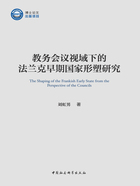
Abstract
When the Gaulish society transitioned from late Antiquity to early Medieval period from the year 511 to 696,Gaulish Episcopate in regnum Francorum held dozens of historical councils,which had both epochal and and transformative character.Since the early modern era,western academia has been attracted to the manuscripts of the Merovingian councils’ canon law.The scholars carried out comprehensive research on these historical documents and achieved remarkable results from the perspectives of religion,politics,sociology and culturology studies.However,they failed to focus on the relationship between the councils and the construction of the Frankish Christian kingdom.
A detailed scrutiny of the conciliar canons and other related sources show that the episcopal collegiality,which is derivative from the Apostolic Succession,has a highly intertwined and interdependent relationship with the Gaulish secular regime.When the Frankish kings increased reliance on the application of Christian faith,the councils,which cohered a collegiate spirit,gradually ascended from a church tradition to an act of regnum,and its canons for a wide range of issues contributed to the Frankish national construction.The rituals and decrees of the councils perfectly displayed the Christian sanctity of the Frankish royal authority,and they conveyed the symbolic connotation that the king considered and handled the country's matters with the bishops.As the Merovingian Kings were recognized as the orthodox Christian monarchs by the Gaulish episcopate,they naturally assumed the religious mission of opposing heresy and paganism.The decision of the councils to restrict the intercourse between Christians and Jews escalated into the anti-Semitic policies dominated by public authority aimed at building Christian identity.However,the victory of orthodox Christianity in Frankish Gaul does not mean that the majority of people have become Children of God who met the ecclesiastical standards.For a long time,the Gaulish social life still retained traces of pagan customs.In this social situation,the councils restored the inner order of the Frankish people through the institutional arrangements of the Gallican liturgy.As the interaction between the clergy and the general public continued and deepened,their relationship stepped beyond the realm of religious supervision.Diocesan bishops assumed the obligations of organizing production,defending the enemy and protecting the people,social relief and judicial assistance.The Church established a wide presence,governed people's lives and represented popular will in the Frankish kingdom.The Church fixed the inadequacy of local public education and missteps in the Frankish Monarchy's administration to a large extent.Perhaps that is why the Merovingian kings seemed to enjoy far less love and loyalty than the local bishops who could personally take care of people's everyday life.Because of their parental role,bishops were usually aware of people's suffering.In balancing human equality (aequalitas) and the divine dispensation (dispensatio),the councils formed by bishops tried to relieve the slaves’ suffering.The creation and development of this relief not only established a new consensus between the slaveowners and their slaves in a relatively peaceful way,but also provided an effective model for the formation and development of Frankish Kingdom's feudal mode of production.
In general,during the Merovingian period when the classical civilization had ended and the medieval European civilization was coming into shape,with the assistance of the councils,the Frankish church-state elites jointly created a Frankish early state with ecclesiastical characteristics,in a tug of war between political ideals and the social reality in the post-Roman Mediterranean world.
Key words:Merovingian Gallican councils;Gaulish episcopate;Merovingian kings;Frankish early state